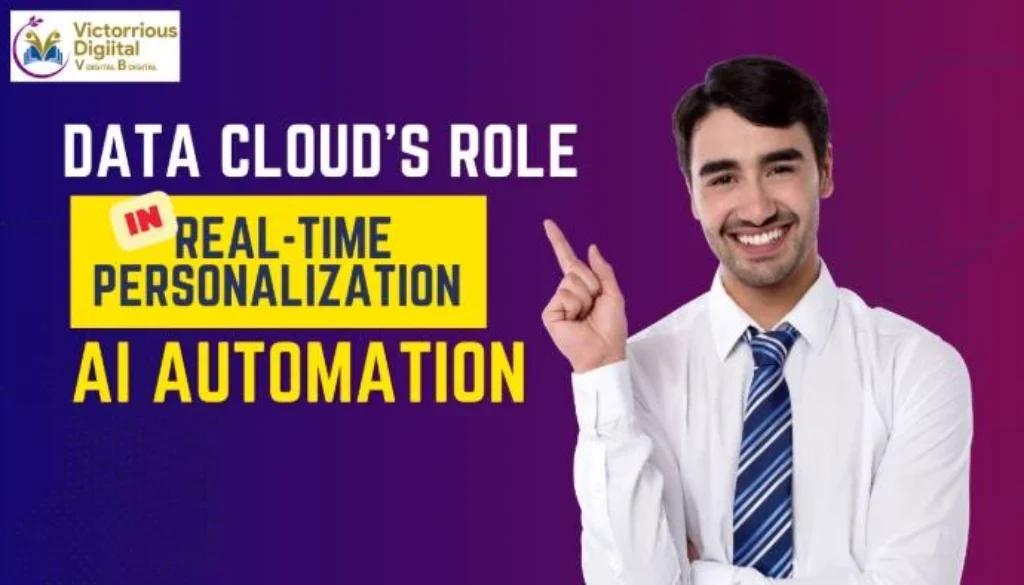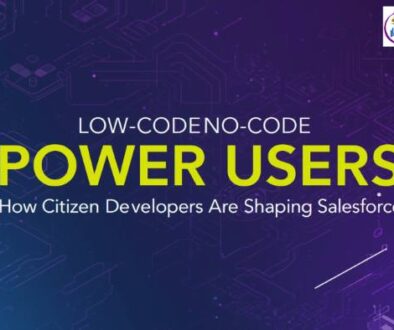Data Cloud’s Role in Real-Time Personalization & AI Automation
In today’s digital world, customers expect personalized experiences. They don’t want generic emails or ads—they want brands to understand their needs in the moment and respond instantly. Salesforce Data Cloud makes this possible. It connects all customer data in real time and powers AI automation to deliver experiences that feel personal, timely, and relevant.
In this blog, we’ll explain what Data Cloud is, how it works, and how it supports real-time personalization and AI automation. Whether you are new to Salesforce or just starting to explore AI in marketing and sales, this guide will help you understand why Data Cloud is becoming so important in 2025.
Table of Contents
What is Data Cloud?
Salesforce Data Cloud is a real-time customer data platform (CDP). This means it collects data from multiple sources—such as websites, apps, emails, CRMs, and even offline systems—and combines it into a single, unified view of the customer.
Instead of scattered information, businesses get a complete picture of who their customer is and what they are doing right now.
For example:
- If a customer browses a product on your website, that information goes into Data Cloud immediately.
- If the same customer calls your support team, Data Cloud connects that conversation with their online behavior.
- If they click on an email or interact on social media, it’s updated in real time.
All this connected data becomes the foundation for AI-driven personalization.
Why Real-Time Personalization Matters
Traditional marketing often works with old data. You might send an email based on what a customer did last week, but by now, their interests have already changed. Real-time personalization solves this problem.
With Data Cloud, businesses can:
- Understand what a customer is doing right now
- Deliver messages or offers at the right time
- Improve engagement and build stronger relationships
For example:
- If a customer adds shoes to their cart but doesn’t check out, Data Cloud can trigger an AI-driven message instantly offering a discount.
- If a banking customer shows interest in home loans on the website, AI can personalize an email with loan options within minutes.
This is not just fast—it feels personal and relevant, which is exactly what today’s customers expect.
How Data Cloud Powers AI Automation
AI becomes more powerful when it has access to real-time, unified data. This is where Data Cloud and AI work hand in hand.
Here’s how it happens step by step:
Step 1: Collect and Unify Data
Data Cloud connects data from multiple sources—CRM, website, mobile apps, social platforms, and even offline systems. All this information is cleaned and combined into a single customer profile.
Step 2: Analyze with AI Models
Once the data is unified, AI tools like Einstein GPT and Agentforce can analyze it. They can predict customer behavior, identify preferences, and even recommend next best actions.
Step 3: Trigger Automated Actions
With automation, businesses don’t need to manually act on every insight. The system can automatically:
- Send a personalized email
- Alert a sales rep about a hot lead
- Recommend a product in an app
- Start a customer service workflow
Step 4: Learn and Improve
The more customers interact, the more data the system collects. AI learns from this behavior, making personalization smarter over time.
Examples of Data Cloud in Action
To make this easier, let’s look at a few real-world use cases.
1. Retail Example: A customer visits an online clothing store, browses jackets, but doesn’t buy. Data Cloud captures this activity in real time. AI automation then sends a push notification:
“Still thinking about jackets? Here’s 10% off for the next 24 hours.”
2. Banking Example: A customer checks home loan calculators on a bank’s website. Within minutes, Data Cloud triggers AI to send a personalized email:
“Looking for the right loan? Here are three options based on your profile.”
3. Healthcare Example: A patient books an appointment online. Data Cloud connects this with their health history and AI automatically sends reminders, check-up instructions, and post-visit follow-ups.
These workflows feel natural to the customer but are powered by Data Cloud’s intelligence behind the scenes.
Benefits of Using Data Cloud for Personalization & Automation
Here are some of the main advantages businesses see:
- Faster Response Times – React to customer actions instantly.
- Higher Engagement – Personalized messages mean more clicks, opens, and conversions.
- Better Sales Opportunities – Sales teams know exactly when a customer is ready to buy.
- Improved Customer Experience – Customers feel understood, not spammed.
- Smarter AI Predictions – More data means better insights for future decisions.
How to Get Started with Data Cloud
If you’re a beginner, here’s a simple roadmap:
- Learn the Basics of Salesforce – Start with CRM and core tools.
- Understand Data Sources – Identify where your customer data is coming from.
- Connect Systems – Use Data Cloud to unify data across all touchpoints.
- Enable AI Features – Turn on Einstein GPT and Agentforce for personalization and automation.
- Start Small – Begin with one or two automated campaigns, then scale.
The Future of Data Cloud and AI
In 2025 and beyond, Data Cloud is expected to become the backbone of customer engagement. With AI advancing quickly, automation will move from simple tasks (like sending emails) to more complex workflows (like managing entire customer journeys without manual work).
Businesses that adopt Data Cloud now will be ahead in creating experiences customers actually love.
Conclusion
Salesforce Data Cloud is more than just a data platform—it’s the engine that makes real-time personalization and AI automation possible. By unifying customer data and connecting it with powerful AI, businesses can respond instantly, personalize every interaction, and create lasting customer relationships.
If you want to learn how to use Data Cloud in real business scenarios, you can join Salesforce classes in Pune with Victorious Digital, where you’ll get hands-on experience with the latest Salesforce AI tools.
Also Read: Marketing Cloud and AI | How Einstein Can Optimize Your Campaigns?




